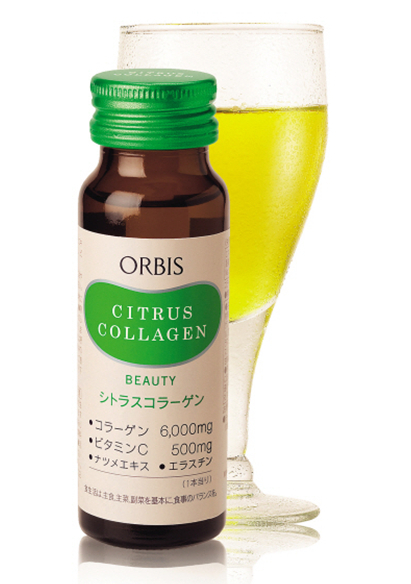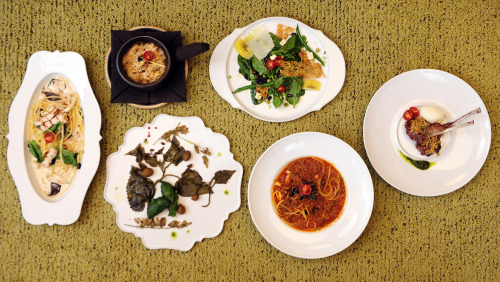Korean consumers showing increased interest in beauty food productsIn Korea, the desire to reverse time, to stall its effect on our appearance has spurred the growth of the beauty food market.
Supplements, jellies and drinks all promising to help rejuvenate skin have been edging their way into an industry dominated by cosmetics, treatments and surgery.
“About two to three years ago, I believe that is when the inner beauty trend started to gain momentum here,” said ORBIS Korea, Inc. marketing team assistant manager Kim Min-jeong.
Kim, 30, placed one of their bestselling products on the table.
Packaged in a dark brown bottle was the Japanese beauty brand’s answer to edible cosmetics ― collagen.
Essentially the protein in our skin that keeps it firm and plump, women have been injecting it into their faces and lips for years. Now, apparently, women are imbibing it.
“Collagen food products are so widespread in Japan that almost all Japanese cosmetics companies have put their versions out on the market,” Kim said. “Now, it is considered essential to consume beauty products as well as apply them.”
The trend is catching on in Korea.
Kim singled out the “well-being” movement toward a healthier lifestyle as a potential catalyst to increased interest in beauty food products here.
ORBIS’ Citrus Collagen drink entered the South Korean market nearly two years ago and, according to Kim, “is the leading item in our food product line-up” with “the highest number of repeat purchases.”

ORBIS Citrus Collagen delivers 6,000 mg of collagen — sourced from pigs — per bottle. (ORBIS)
ORBIS’ beauty beverage contains 6,000 mg of collagen (the equivalent of three steaks) sourced from pigs, said Kim. Other ingredients include elastin ― another skin-tightening protein ― and vitamin C.
When the cap is unscrewed, a slight whiff of animal fat serves as a reminder of the drink’s high collagen content. Aside from that, ORBIS’ Citrus Collagen tastes slightly tart and redolent of oranges and lemons.
The brand’s other collagen product, a lychee-flavored jelly packaged into slim sachets, resembles a sweet, fruity snack.
While Japanese cosmetics companies have a head start in the burgeoning niche market, Korean companies are not far behind.
CJ CheilJedang released Innerb in May 2009, approximately two months before ORBIS’ Citrus Collagen landed in Korea. Amore Pacific followed up with VB Program Super Collagen in July 2010.
Nearly a year and a half after it launched, CJ’s Innerb witnessed a sharp increase in sales after TV ads featuring singer Seo In-young aired last October.
Sales for January totaled 3.3 billion won ($3 million). March rang in sales figures of 4.2 billion won ($3.9 million).
“Basically, one bottle is sold every minute,” Innerb brand manager Ko Eun-bi, 36, said over the phone.
According to Ko, hyaluronic acid acts as a mechanism inside our skin to store moisture. The amount of acid naturally present starts to decrease as we age, resulting in increasingly dry skin.
Innerb, essentially a hyaluronic acid supplement, proposes to help women maintain their skin’s ability to retain moisture.
Cho Young-min, 32 ― a certified clinical nutritionist of Chaum’s Food Therapy team ― does not discount the possible beneficial effects of consuming hyaluronic acid, collagen, or elastin as beauty supplements, stating that “it can be helpful and good.”
“However, it would be best to consume them in their natural state,” Cho said.
After a tour of the Food Therapy center located in Chaum ― a medical facility a.k.a. “Anti-aging Life Center” ― Cho and executive chef Youm Jung-phill of the facility’s restaurant, Les Trois, sat down to recommend foods and dishes that might help improve skin and prevent it from aging.

Les Trois’ anti-aging dishes promise to help stall the effects of time — (from left to right, clockwise) Gorgonzola Sauce with Chicken Pasta, Chicken and Black Garlic Risotto, Spinach and Bean Salad for Your Health, Grilled Lamb with Sesame Sauce, Bolognese Pasta with Bean Paste, Natural Pickles and Rice Wrapped in Greens. (Park Hae-mook/The Korea Herald)
Located in Seoul’s affluent Cheongdam-dong, Chaum’s Les Trois boasts a complex array of healthful dishes orchestrated by executive chef Youm and the nutritionists and physicians of the Food Therapy team.
Bespoke meals tailored to meet the needs of patients who are taking part in the Food Therapy Program are served at Les Trois, which also has a separate room where one-on-one cooking classes are held for patients who want to make meals at home that fit their dietary needs.
According to nutritionist Cho, many patients come looking for ways to stay youthful through what they eat, which might be why Les Trois serves an“Anti-Aging Lunch Set” (38,000 won) and other anti-aging dishes.
Executive chef Youm pulled from Les Trois’ menu to illustrate how beauty food in its more organic state can be incorporated into meals.
Youm said, “Our chicken and black garlic risotto is made with broth extracted from chicken feet,” an ingredient Cho noted as chock full of collagen (the protein often used in beauty drinks and supplements).
“Bokbunja,” Korean black raspberries, which Cho said prevents aging through its antioxidant properties, is worked into a dessert crepe, while pickled mulberries are incorporated into an upcoming dish of rice wrapped in greens.
Mulberries, according to Cho, contain a lot of vitamin C, a nutrient that is good for the skin.
Youm also revealed that they are developing dishes around watermelon, which he pinpointed as another beauty food.
Blueberries and kiwis also made it onto Cho’s list.
As a general rule of thumb, Cho stressed the importance of eating beauty food in moderation.
“Just because something is good does not mean it should be consumed in excess,” she said.
By Jean Oh (
oh_jean@heraldcorp.com)
Details● Chaum,
www.chaum.net, (02) 3015-5077. Les Trois is open from noon to 10 p.m. daily (desserts and drinks only from 3 p.m. to 6 p.m.). The Anti-Aging Lunch Set (38,000 won) must be reserved one week in advance. Weekday lunch ranges from around 12,000 won to 28,000 won, dinner from around 16,000 won to 35,000 won. Buffets served on weekends cost 20,000 won to 50,000 won.
● ORBIS Citrus Collagen, 10 bottles cost 27,000 won,
www.orbis.co.kr, (080) 301-5252 ● CJ Innerb Aqua Force (which also contains collagen) costs 83,000 won per bottle, Innerb Aqua Bank costs 63,000 won per bottle,
www.cjinnerb.com,
(080) 310-1010
● VB Program Super Collagen, 30 ampoules costs 90,000 won,
www.vbprogram.co.kr, (080) 023-5454







![[KH Explains] How should Korea adjust its trade defenses against Chinese EVs?](http://res.heraldm.com/phpwas/restmb_idxmake.php?idx=645&simg=/content/image/2024/04/15/20240415050562_0.jpg&u=20240415144419)